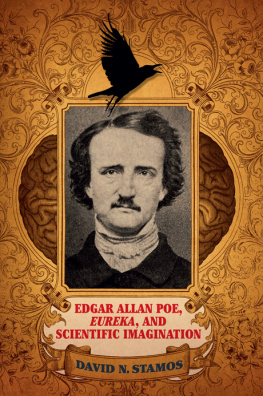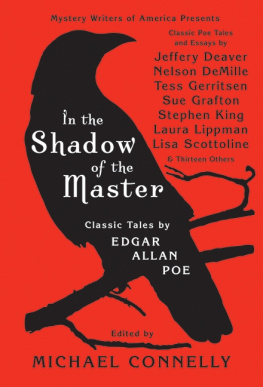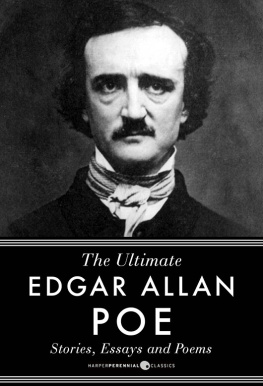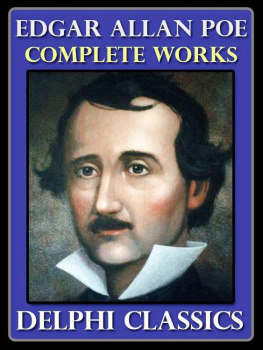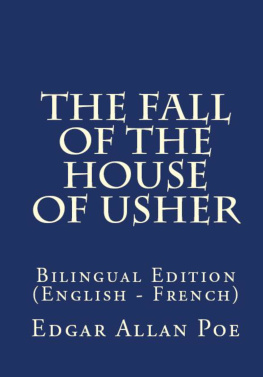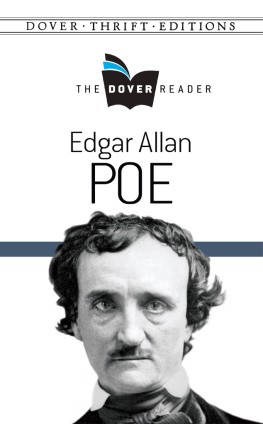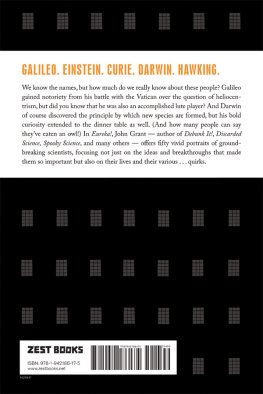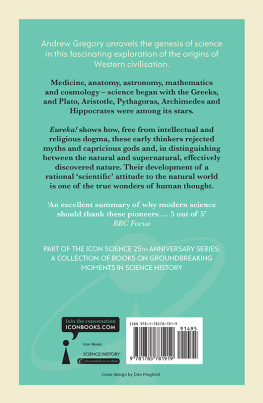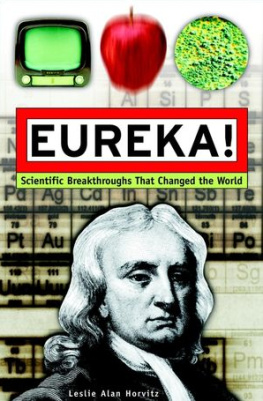Edgar Allan Poe,
Eureka,
and
Scientific Imagination
Edgar Allan Poe,
Eureka,
and
Scientific Imagination
DAVID N. STAMOS
Mathew Brady photograph of Poe, seated, ca. 1845/1848.
Courtesy of the Edgar Allan Poe Museum.
Published by State University of New York Press, Albany
2017 State University of New York
All rights reserved
Printed in the United States of America
No part of this book may be used or reproduced in any manner whatsoever without written permission. No part of this book may be stored in a retrieval system or transmitted in any form or by any means including electronic, electrostatic, magnetic tape, mechanical, photocopying, recording, or otherwise without the prior permission in writing of the publisher.
For information, contact State University of New York Press, Albany, NY
www.sunypress.edu
Production, Jenn M. Bennett
Marketing, Kate R. Seburyamo
Library of Congress Cataloging-in-Publication Data
Names: Stamos, David N., author.
Title: Edgar Allan Poe, Eureka, and scientific imagination / David N. Stamos.
Description: Albany, NY : State University of New York Press, 2017. | Includes bibliographical references and index.
Identifiers: LCCN 2016031441 (print) | LCCN 2016049033 (ebook) | ISBN 9781438463919 (hardcover : alk. paper) | ISBN 9781438463926 (e-book)
Subjects: LCSH: Poe, Edgar Allan, 1809-1849KnowledgeScience. | Poe, Edgar Allan, 1809-1849Religion. | Poe, Edgar Allan, 1809-1849. Eureka. | Imagination. | Creative ability. | SciencePhilosophy.
Classification: LCC PS2642.S3 S73 2017 (print) | LCC PS2642.S3 (ebook) | DDC 818/.309dc23
LC record available at https://lccn.loc.gov/2016031441
10 9 8 7 6 5 4 3 2 1
To John Cusack,
and the makers of The Raven ,
for their wonderfully imaginative tribute to Poe,
to the man and his powers of ratiocination,
dedicated here is thisoctavo,
for evermore.
Contents
Acknowledgments

I am deeply indebted to my editor at SUNY Press, Andrew Kenyon, and the two scholars he commissioned as anonymous reviewers, to the production editor, Jenn Bennett, and the production team, to the copy editor, John Wentworth, and to the artist. A debt of thanks is also due to a select group of friends and acquaintances, (some of them former students,) either for their inspiration, or for guiding me toward certain readings, or for feedback on certain chapters or parts thereof, namely, Robert H. Haynes, Bernard Lightman, Jason Buccheri, Mauro Buccheri, Julia Tourianski, David Livingstone Smith, Graham McCreath, George Perry, Brandon Fenton, Bobbak Makooie, Andrew Robinson, Karina Chornenka, Neven Sesardic, Susan Chen, Vincenzo Domanico, Kassandra Sharma, Neda Maki, and last but not least, Matthew H. Kelley, Suzanne Underwood Rhodes, William E. Engel, and the other scholars I had the pleasure to meet and converse with at the Fourth International Edgar Allan Poe Conference held in Manhattan at the end of February 2015, where I gave my talk on Poes double Dupin.
Sources
F or references to and quotations from Poes writings, I usually refer to the collections listed below rather than the original sources of publication. The year following a work by Poe, for example The Raven (1845), indicates the year of its earliest publication or the year of composition if it was unpublished. Pages following a work refer to the following collections:
| P&T | Patrick F. Quinn, ed. (1984). Edgar Allan Poe: Poetry and Tales . New York: Library of America. |
| E&R | G.R. Thompson, ed. (1984). Edgar Allan Poe: Essays and Reviews . New York: Library of America. |
| Brevities | Burton R. Pollin, ed. (1985). The Brevities: Pinakidia, Marginalia, Fifty Suggestions, and Other Works . New York: Gordian Press. |
| Letters | John Ward Ostrom, Burton R. Pollin, and Jeffrey A. Savoye, eds. (2008). The Collected Letters of Edgar Allan Poe . 3rd ed. New York: Gordian Press. |
The following are anthologies I use with varying frequency:
| Recognition | Eric W. Carlson, ed. (1966). The Recognition of Edgar Allan Poe: Selected Criticism Since 1829 . Ann Arbor: University of Michigan Press. |
| Critical Heritage | I.M. Walker, ed. (1986). Edgar Allan Poe: The Critical Heritage . New York: Routledge & Kegan Paul. This is a useful collection consisting primarily of contemporary reviews of Poes work and obituaries. |
| Companion | Kevin J. Hayes, ed. (2002). The Cambridge Companion to Edgar Allan Poe . Cambridge: Cambridge University Press. A collection of modern essays in the prestigious Cambridge Companion series, but partly anti-Poe. |
| Context | Kevin J. Hayes, ed. (2013). Edgar Allan Poe in Context . Cambridge: Cambridge University Press. A collection rich in background information on the many contexts in which Poe was embedded. |
In terms of biographies of Poe, I make use of the following:
| Weiss | Susan Archer Weiss (1907). The Home Life of Poe . New York: Broadway Publishing. As Susan Talley, she knew Poe during the last three months of his life and also many of those who knew Poe. |
| Quinn | Arthur Hobson Quinn (1941). Edgar Allan Poe: A Critical Biography . New York: D. Appleton-Century Company. In spite of being dated, many Poe scholars still consider this the definitive biography of Poe. |
| Poe Log | Dwight Thomas and David K. Jackson (1987). The Poe Log: A Documentary Life of Edgar Allan Poe 18091849 . Boston: G.K. Hall & Co. This book is of inestimable value for tracing the chronology of Poes life on a daily basis. |
| Silverman | Kenneth Silverman (1991). Edgar A. Poe: Mournful and Neverending Remembrance . New York: HarperCollins. |
| Hutchisson | James M. Hutchisson (2005). Poe . Jackson: University Press of Mississippi. |
| Ackroyd | Peter Ackroyd (2008). Poe: A Life Cut Short . London: Chatto & Windus. |
Aside from biographies and critical collections, there are many useful monographs and commentaries on aspects of Poes writings. The ones I make the most use of are the following:
| Hoffman | Daniel Hoffman (1972). Poe Poe Poe Poe Poe Poe Poe . New York: Paragon House. This is a classic, for better and for worse. |
| Peeples | Scott Peeples (2004). The Afterlife of Edgar Allan Poe . Rochester, NY: Camden House. |
| Eureka | Stuart Levine and Susan F. Levine, eds. (2004). Edgar Allan Poe: Eureka . Champaign: University of Illinois Press. This is an annotated text of Poes Eureka that I use mainly for its annotations. |
| Critical Theory | Stuart Levine and Susan F. Levine, eds. (2009). Edgar Allan Poe: Critical Theory, The Major Documents . Champaign: University of Illinois Press. |
| Zimmerman | Brett Zimmerman (2005). Edgar Allan Poe: Rhetoric and Style . Montreal & Kingston: McGill-Queens University Press. |
| Fisher | Benjamin F. Fisher (2008). The Cambridge Introduction to Edgar Allan Poe . Cambridge: Cambridge University Press. |

